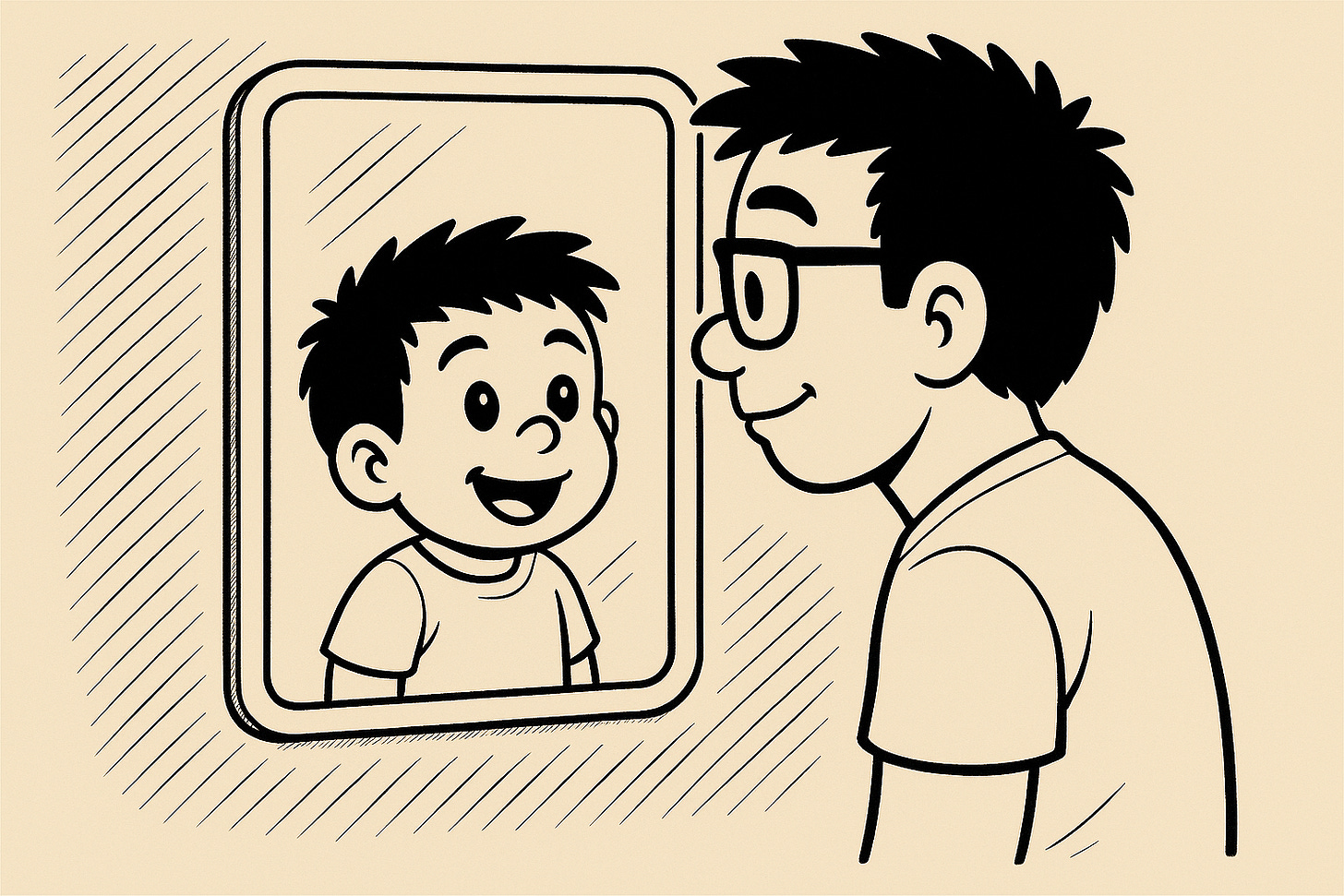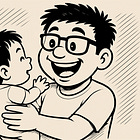How Parenthood Teaches Self-Governance
When raising our kids ends up reshaping the way we lead ourselves.
Growing up, one phrase from my dad stayed with me. He used to say:
The love one feels for their kids can’t be described. You will understand when you have kids of your own.
He was right.
Parenthood became the most rewarding stage of my life; not that being a husband is not rewarding, but it changed the center of my choices and the way I think about direction. My kids anchor a lot of that. They point me toward the future I’d like for them and the kind of person I want to become as they grow.
When my oldest was born, my dad asked me:
Do you understand it now?
There was no need to answer.
Before my second child arrived, he shared something he once wondered when my mom was expecting my middle sibling. He used to ask himself:
How am I going to love this kid as much as I love my first one. How does one distribute the love.
He later realized that love does not divide. It grows. I felt the same when my second child arrived. It did not take anything away from the first. It expanded on its own.
That feeling showed me something new. I realized that what mattered the most to me were the principles our kids grow around and the kind of environment that holds them steady. That is the legacy I want to leave them: education, principles, and values.
Parenthood asks a lot from us. It reveals the parts we have overlooked. Our children reflect traits we carry, the ones we have worked on and the ones we avoided. Seeing those traits appear through them feels like meeting a younger version of ourselves we left behind.
What I have come to realize is that the hardest parts of parenthood do not say anything about our kids. They show how much we are trying to do things right. And those moments, as uncomfortable as they feel, are the ones that move us toward self-governance.
The mirror we do not expect
Something I have noticed is that kids, in their innocence, reflect things we thought we had handled or outgrown. They do not do it to provoke us. It is simply how development works. They carry pieces of us that stayed quiet for years. Seeing those pieces outside of ourselves makes them impossible to ignore.
And it does not always come from big moments. Most of the time, it appears in the small stuff. The interruptions. The tired afternoons. The days when patience feels thin. Hard parenthood does not come from crises. It grows slowly, through the accumulation of moments when something inside us gets touched.
Those traits never disappeared. They were dormant. They show up again only when someone else’s growth depends on our ability to respond. That is when everything feels closer and more exposed. We start to see the patterns we built to protect ourselves and the ones we hoped were behind us.
This is where the real difficulty began for me. It was not my kids. It was the part of myself that still needed attention and the effort to give my kids what I once needed. When you realize your unresolved patterns could become your child’s starting point, the work becomes personal. It becomes intentional. You want your kids to step into life without the same internal obstacles you had to climb.
👉 Drifting?
Lock in $7.99/month before Dec. 1st (rising to $11.99).
Weekly Katas, Sequences, and Mental Models you can train on easy days and deploy when focus breaks.
Why the weight feels personal
These moments carry weight because they touch something deep. They connect your past with your child’s future. They force you to look at the behaviors you carry. It is one thing to live with your own contradictions. It is another to watch them shape someone who depends on you.
Living with generalized anxiety disorder makes this even clearer for me. It makes me more aware of what I do, what I avoid, and how certain habits might influence them. I notice my tone. I notice the reactions that rise when tension builds. Anxiety does not disappear when you become a parent. It actually becomes a strength, or at least reframing it that way has been helpful. It sharpens your awareness of what you might be passing on. In my case, it translates sometimes into asking my wife, “Was I too hard with them?” or telling her, “I will work on not doing that next time.”
These moments ask for clarity. You see the long arc of your history next to the beginning of theirs. Each reaction teaches something. Every silence teaches something. Every correction leaves a mark they will interpret in their own way.
When we arrive at these moments, there are two paths.
We can unload the discomfort onto the child, which creates distance and repeats old patterns.
Or we can pause and decide how we want to shape the moment. That pause becomes the space where self-governance takes form. It is where we choose not to hand down what once held us back. Every deliberate step strengthens our ability to guide ourselves and gives our kids a different path to grow through.
Kids benefit from these adjustments. They do not need perfection. They need presence. They learn through correction and repair. Each return shapes the environment they rise in.
This is why these moments feel so personal. They speak to who we were, who we are now, and who we hope our children become. And when we respond with intention instead of impulse, the impact moves in both directions.
What happens in the brain when parenting feels hard
There is a biological reason these moments feel so intense. Becoming a parent does not just change your schedule; it changes your brain. The amygdala becomes more responsive to your child’s signals, so you pick up more quickly on their cries, their expressions, their shifts in mood. The prefrontal cortex, which is in charge of planning and regulation, has to work harder to keep everything in check while you are dealing with stress, lack of sleep, and a constant stream of decisions1.
On top of that, parenting activates what researchers often call a parental caregiving network. It includes regions like parts of the anterior cingulate cortex and the insula, along with other social brain areas2. These regions help you track things like tone of voice, posture, and tiny changes in your child’s behavior. In practice, that means you become more alert and more emotionally available, and also more sensitive to anything that feels off.
Hormones layer on top of this. Oxytocin, the so-called bonding hormone, supports attachment and synchrony between parent and child. Higher oxytocin levels are linked with more attuned, responsive caregiving and closer parent–infant interactions3. The more bonded you feel, the more every signal from your child matters. At the same time, the stress systems become more reactive when the caregiving environment is demanding4. That combination of deep care and higher reactivity can make everyday situations feel heavier than they look from the outside. The intensity you feel is not proof that something is broken; it shows how engaged your system is in caring for someone who depends on you.
The good news is that these circuits are trainable. With repetition, every time you notice what is happening, pause, and choose how to respond, the regulatory networks in the prefrontal cortex get better at handling strong emotional signals from deeper regions5. Over time, your brain becomes more capable of holding that intensity without being dragged around by it. That is one of the ways self-governance starts forming from the inside out.
What growth starts to look like from the inside
Growth in parenthood does not show up as a big revelation. It appears in how we handle ordinary moments. When we apologize after reacting poorly. When we admit we are tired. When we stay present even when it is difficult. These moments create awareness. Awareness becomes the first step toward self-governance.
Small adjustments matter. The tone we use. The breath we take before answering. The second we catch ourselves before a reaction takes over. These shifts teach more than any speech. They show our kids what steadiness looks like.
Children grow with a brain ready to adapt. They absorb patterns long before they understand them. They imitate what they see. Every act of realignment becomes part of their internal structure. Each repeated correction builds neural paths that help them handle conflict, connection, and responsibility.
You can see growth through conduct long before it becomes a feeling. When a response is calmer. When a pause appears. When a correction feels grounded instead of reactive. These signs show the work is taking hold.
Missteps will happen. What matters is returning. Every return strengthens the pattern we want to build and gives our kids another example of how to recover when emotion rises.
With time, the difficulty shifts. It becomes proof that we are interrupting patterns instead of passing them on. It shows we can give our kids the margin we never had. Each moment of intention builds a foundation for both of us.
What can we take from this?
So I guess the way I see it is this: when we feel challenged by our kids, we have to remember that the real challenge is not coming from them. It comes from the part of us that is still unresolved, the part we are still trying to figure out. Once we see that, the weight changes. We stop taking things out on them. We protect the connection. And we start paying attention to the parts of ourselves that keep pulling us back.
Seeing it this way brings us closer to self-awareness. We learn to notice the moments that need tuning. We give our brain more chances to reorganize. We become a little steadier and a little more intentional each time.
With time, we start recognizing when we need to pause. We stop and assess the moment. And little by little, we learn to flip the switch and respond in a different way. It takes repetition. It takes patience. It works.
And that is why the difficult moments matter. When parenthood feels hard, it is not because our children are difficult. It is because we are trying to guide them with intention. That effort becomes the opening where self-governance starts to take shape.
In our next paid companion, we will work on practicing those moments that need tuning. Mostly to exercise the muscle of self-awareness and emotional regulation, so that when the time comes, our mind is prepared to respond with clarity.
For now, if you do not have children but want them someday, take time to learn about yourself. There is room to grow ahead of time. If you are not planning to have kids, this still applies. It may help you heal things that remain unresolved.
And if you do have kids, stop reading this and go give them a hug. Tell them you love them and play with them until the sun sets.
Have a wonderful week!
✨ Ideas Worth Exploring
If this piece resonated, here are a few more that go hand-in-hand.
Enjoying this? Support the mission.
I write Self-Disciplined to help more people build real, lasting discipline — without burnout. If my work has helped you, consider supporting it with a coffee or becoming a member.
Swain, J. E. (2011). The human parental brain: In vivo neuroimaging. Progress in Neuro-Psychopharmacology & Biological Psychiatry, 35(5), 1242–1254. https://doi.org/10.1016/j.pnpbp.2010.10.017
Feldman, R. (2015). The adaptive human parental brain: Implications for children’s social development. Trends in Neurosciences, 38(6), 387–399. https://doi.org/10.1016/j.tins.2015.04.004
Scatliffe, N., Casavant, S, Vittner, D., & Cong, X. (2019). Oxytocin and early parent–infant interactions: A systematic review. International Journal of Nursing Sciences, 6(4), 445–453. https://doi.org/10.1016/j.ijnss.2019.09.009
Mueller, I., Snidman, N., DiCorcia, J. A., & Tronick, E. (2021). Acute maternal stress disrupts infant regulation of the autonomic nervous system and behavior: A CASP study. Frontiers in Psychiatry, 12, 714664. https://doi.org/10.3389/fpsyt.2021.714664
Ochsner, K. N., & Gross, J. J. (2008). Cognitive emotion regulation: Insights from social cognitive and affective neuroscience. Current Directions in Psychological Science, 17(2), 153–158. https://doi.org/10.1111/j.1467-8721.2008.00566.x







